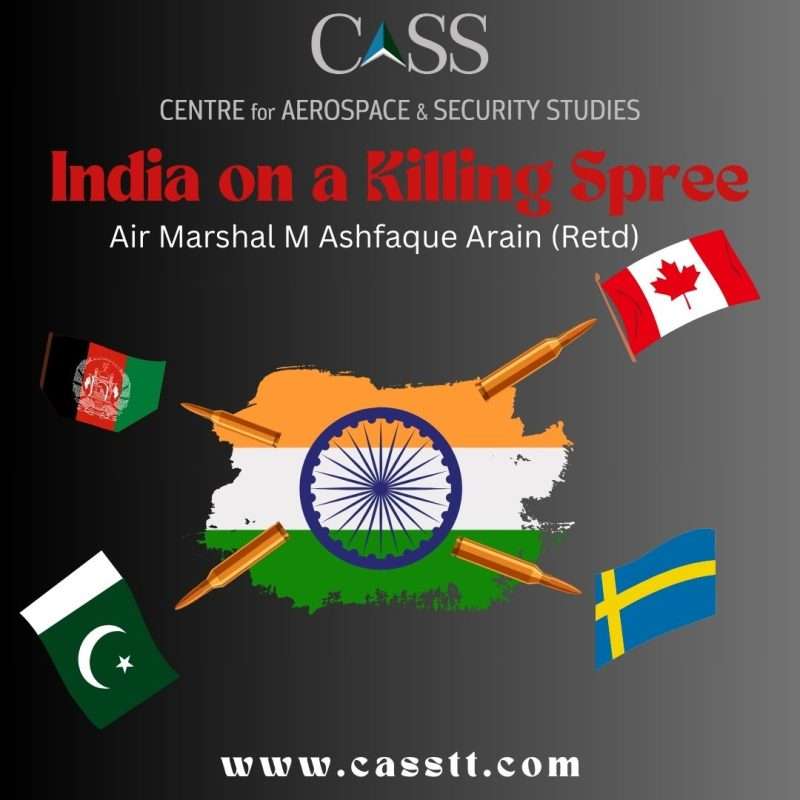For a long time, India has projected itself as the world’s largest democracy. Western countries, driven by their economic and geopolitical interests, have often overlooked Indian, especially the present government’s human rights violations, persecution of minorities, curbs on media and even support for terrorist activities on foreign countries. The world’s attitude of ignoring such excesses gave confidence to India to such an extent that it did not hesitate to commit an assassination on Canadian soil. The assassination of a Sikh separatist activist and Canadian citizen, Hardeep Singh Nijjar, has shaken the West out of its slumber.
Prime Minister Narendra Modi’s government has been targeting numerous dissenting voices, especially those advocating for freedom and currently residing abroad. Despite the diplomatic row between Canada and India regarding the killing of Hardeep Singh Nijjar, another Sikh activist Sukhdool Singh was killed in Winnipeg, Canada. He was wanted by India in seven cases and had moved to Canada in 2017. Over the past year, five people considered freedom activists by India, have been killed in Pakistan. These include a Sikh Paramjeet Singh Panjwar and four Kashmiri origin individuals. They included Bashir Ahmed Peer, Syed Khalid Raza, Muhammad Riaz and Saleem Rehmani. Aijaz Ahmed Ahangar, another Kashmiri freedom activist was killed in Kunar province of Afghanistan. The Indian media, such as Tribune India had in all such cases claimed that these alleged ‘terror kingpins’ were being targeted outside India.
When direct action was not feasible, there were instances where India tarnished the Sikh community through contrived incidents. Desecration of Hindu temples in Australia for which Sikhs were blamed is one such example. According to the Australian police, after investigating the graffiti that defaced the outer wall of a temple in Brisbane, they were prepared to close the case due to the absence of leads from the complainants. The police indicated that the anti-Modi graffiti, which was executed on the night of March 3, seemed to have a ‘Hindu hand’ behind it, even though it was initially attributed to pro-Khalistan elements. According to Times of India, police investigators theorised that Hindus defaced their own temple after shutting off the key CCTV cameras purposely and the serial offender who had done similar mischief in Victoria had then sneaked into Brisbane’s Sikh rally of March 4 this year.
For years, Pakistan has voiced concerns about India’s alleged involvement in illicit and terrorist activities on its territory. Arrest of a serving Indian Navy officer in Pakistan with involvement in acts of terrorism in Sind and Balochistan provinces has been the clearest proof. The West, owing to its economic and geopolitical interests, however, never took such things seriously. As a consequence, a more assertive India has now resorted to similar acts in its friendly Western countries.
The dispute between Canada and India holds significance for the emerging Indo-Pacific framework and numerous other Western alliances. With geoeconomic and geopolitical interests at stake, all member countries in these alliances are faced with a difficult situation. However, all these functioning democracies have one thing in common, very diverse populations. These countries owe their progress and success to the constitutional liberal order which they follow. India, however, strengthened by such acts in its neighborhood, has unwittingly violated this order by killing a Canadian citizen. Western democracies, despite their economic and geopolitical interests, have no choice but to protect their value system to ensure continued integrity and harmony in their societies.
The Indian government, seemingly unable to grasp these nuances and accustomed to exerting pressure on neighbouring countries in analogous situations, instead of cooperating with Canadian authorities in the investigation, has focused on blaming Canada for sheltering terrorists. At the same time, the Indian media has leashed an offensive against Canada. The media fails to understand the fundamental difference between overtly acknowledging a covert operation, as the US does, and outright denial, which is India’s apparent approach. They are, thus, comparing it with US actions against Osama bin Laden and Qasim Sulemani in other countries. They are also now trying to find refuge in the deaths of two Pakistanis, Karima Baloch and Sajid Hussain in Canada and Sweden, respectively.
Canada has not blamed India for this act on its own, rather, it was provided with intelligence information by some of its Five Eyes intelligence partners. Canada is also being supported by the US and other Western countries in an effort to protect their value system.
While this conflict is not likely to create a permanent wedge between India and the West, it has however, debunked Indian claims of sharing the Western value system. The West will also be more vigilant about Indian intent and claims in future. At this point in time, the only honourable way for India is to accept the crime its agencies have committed and support the Canadian government in the investigation and trial of the responsible individuals. Continuing with denials at the official level and manipulating the media to churn out fake information, will only convince the world about the regional countries’ allegations about India.
The author is a retired Air Marshal of the PAF who served as Pakistan’s Air Advisor at New Delhi from 2002-2006, presently working as Director Technologies and International Coordination at Centre for Aerospace & Security Studies, Islamabad, Pakistan. The article was first published in the Nation. He can be reached at cass.thinkers@casstt.com
Design Credit: Mysha Dua Salman




